
“If you make friends with yourself, you will never be alone.” ~Maxwell Maltz
When I was eighteen I glided across the stage in front of my classmates to collect an award from the principal: All-Around Female.
I was a dancer on the drill team; an officer in the a cappella choir; a youth group leader; a singer in the show choir; a member of the honor society, Spanish Club, and Venture Scouts; and top ten in my class.
I wore these achievements like a shield, clueless of what or who I would be without them.
Inevitably, when I moved out of state for college, my shield cracked.
At college, there was no drill team, no honors points, no one to pat me on the back for working hard. I learned quickly that, when excellence is the default, it’s a lot harder to stand out.
With my shield a shambles, I had to search for a new persona—a new person to “be.”
For some people, that might be volunteering or learning an instrument. For me it was making six or seven trips to the KFC buffet line, eating fried chicken and potatoes until my stomach hurt, and then throwing it all up at the nearest gas station.
It wasn’t pretty. But with no other labels to hide behind, it was comforting.
And every so often, I indulged myself in another label: girlfriend. It was so easy to melt into someone else, and it took the focus off me. Still, when I met Randy, I didn’t see it coming. He was a young, compassionate pre-med student who was eager to complete me—and I was happy to let him.
At first, it was a great arrangement. But after a year or so, the full weight of my unhappiness surfaced. I was jobless, directionless, and lonely; I came home to Randy every night, but even he couldn’t fill the caverns I’d created in my life.
Making the decision to move back home and check into an eating disorder treatment center was difficult, but it was also the first decision I’d truly made for myself in a very long time.
***
Getting physically healthy was the first step, but getting mentally healthy was the most important.
One day, the program director asked what my values were. I was stumped. Student? Singer? Daughter? I listed off an encyclopedia of labels I’d used at some point in my life, waiting for a nod of affirmation. But he stared back blankly.
“I’m not asking what you are,” he clarified. “I want to know what’s important to you.”
I struggled with his question, trying desperately to reframe my life from this perspective.
As long as I could remember, I’d been trying so hard to be one thing or another instead of just letting my life evolve organically.
But as it turns out, I’m more than a student, an over-achiever, a writer, or a girlfriend; I’m a young woman who values compassion, empathy, worldliness, and family. Painting that full picture of myself was a huge step forward.
But in my relationship with Randy, it was a huge step backward. Having finally learned I could love myself and be complete on my own, there was no room for him.
I began to feel physically sick when he tried to hug me. I didn’t want him to touch me, or call me, or show me any kind of affection. He was the same kind person I’d always loved, but I felt claustrophobic. Slowly, painfully, I pushed him out.
***
That chapter of my life was debilitating and painful, but I emerged from it with a very important lesson:
Another person will never be able to compensate for the holes in your life. Be your own “other half,” and seek a partner who will complement you, not complete you.
As someone who had always sought external validation—in the form of awards, activities, or relationships—this wasn’t an easy lesson. But it’s been crucial for me in the development of a richer, more mature self.
Do you ever find your features blurring into those of someone else? Do you ever seek validation through compliments from others or likes on Facebook? It’s a difficult habit to break, but here are some ways to become your own biggest fan:
1. Learn about what matters to you.
It’s easy to latch on to different identities when you don’t fully understand what makes you uniquely you. Do you value charity? Is it your goal to travel the world?
Make a list of all the qualities you value in yourself: Are you funny? Driven? Patient? Things like your career, your car, or your body shape will come and go throughout your life. Uncovering the remarkable core aspects of your identity will make you less inclined to cling to external descriptors.
2. Accept responsibility for your life.
One of the reasons it’s so tempting to focus on the negatives we see in ourselves is that it provides a sense of control. If you’re unfulfilled at work, complaining to others can provide a sense of validation. If you’re frustrated that you don’t travel as much as you’d like, rationalizing can be comforting. Stop making excuses and start making changes.
3. Stop comparing!
Obsessing over all the things you wish you had is one of the fastest tracks to unhappiness. I’m guilty of spending hours on Facebook or Pinterest, pining over a friend’s new downtown loft or the hundreds of intricate recipes I don’t have time to whip up every night.
Consider giving yourself a social media allowance, like no more than five minutes of Facebook per day. It will really take the focus off others and put it back on you.
4. Learn to be alone.
When you’re uncomfortable with solitude, it’s easy to cling to others for validation of your worthiness. But what happens when the other person moves on? Relationships entered into out of necessity are bound to end painfully, because our needs change over time.
When you learn to enjoy your alone time, you’ll never need another person to fill the space.
When I first started this process a few years ago, I developed a habit of deflecting the conversation from myself onto other people. When asked what my goals were, I’d tell everyone I wanted to make my parents happy, or that I wished I had it together as much as so-and-so.
My therapist at the time would always tell me, “That’s her garden, stay in yours.”
How can you ever grow a beautiful rose bush if you spend all day eyeing the tulips next door?
Photo by Mitya Kuznetsov
About Jenni Hanley
Jenni Hanley is a freelance writer and editor. In addition to blogging about locally grown food at EatThisDallas.net, she is a contributor for Renfrew Connections, a newsletter providing hope, help, and healing to those struggling with eating disorders.



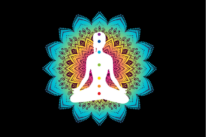



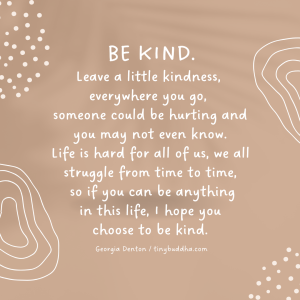
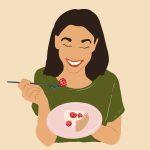


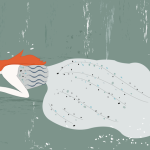
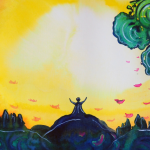
 Though I run this site, it is not mine. It's ours. It's not about me. It's about us. Your stories and your wisdom are just as meaningful as mine.
Though I run this site, it is not mine. It's ours. It's not about me. It's about us. Your stories and your wisdom are just as meaningful as mine. 
In this day and age we are bombarded with messages about what to be and what to do.
It’s increadibly difficult not to get swept away.
So do everything you can to stay grounded in yourself and just live according to YOU and the ones who truly love you.
Confessions by a recovering self-help book addict
This just made me cry. Sometimes discovering the truth, laid out so plainly in words, can release such a well of emotion… Thank you for this piece. It was very needed.
TeeF.
Really strong article. I am glad you made that first decision for yourself!
Put well in words…this is one of the most articles that i loved… maybe because i can relate to! When getting into a relationship with some one as you stated it should always be that they complement you and not complete you because you want to live a better life. Thank you for this 🙂
Thank you for this, I have a couple of people in my life who I’ve shared this with and who I believe will benefit greatly from it.
Great article. Thank you so much for being so open and sharing your story! I’m just coming off breaking it off with someone I really liked but couldn’t give me what I needed so I ended it and have been having a rough time of it. You reminded me that I don’t need a guy to complete me or to fill the space (something I knew before I started dating this person) and what you said about cutting down on the social networking especially struck me. I never realized how detrimental my checking Facebook 14 times a day could be. All the best to you and thank you again.
I also lost my identity when I left my small town home to go to college. I have experimented with several versions of myself in the last 15 years… None of them the true me. I am so excited to have gained this awareness, and I am enjoying strengthening my true self. What an amazing ongoing process!
I’m glad to hear you can pass this on! It always means a lot to me when friends share things they think I’d like, because they know me way better than a search engine!
I’m glad this helped you. I’ll admit, with the social media it’s easier said than done. In a way it feels comforting to scroll down the page and interact with people, but more often than not, you start comparing yourself. Cutting myself off even in a small way really does help!
I don’t know about you, but I tend to be in my head a lot, and it’s easy get lost when you’ve been thinking about the same thing for a while. So sometimes a fresh perspective can be so helpful! Glad you could relate.
There have been many times where I’ve stumbled upon something that was just what I needed to see or hear at the time, and it really is powerful! I’m so happy you were able to relate.
I’m happy you’ve started this process! It’s challenging to step back and look at the big picture sometimes, because labels can be so comforting. Uncertainty is scary, and that’s something I struggle with all the time. But giving yourself permission to just be can really take the pressure off 🙂
Thank you for this. Just taking the time to actually think about being true to yourself and appreciating yourself is something I never do. I love the video by Tanya Davis too. The post and video brightened my day and gave me a new outlook.
Thank you for this article! It’s scary to stand on your own. It feels vulnerable not being behind a label or identity other than YOU. It’s scary to know that when you are you, people may judge you or not like it. But that’s their opinion and you have to know that YOU are worth it every day. When you let go of the fear of not having an “identity”, that’s when you actually find yourself. Once you find yourself, happiness surrounds you. It’s always a nice feeling listening to what YOU want and need and not what you’ve been endlessly told you should need and want.
Ditto all of that!
Great post and there are some valid points here but changing how one uses his or her “shields” to fill voids is oh-so hard…especially if some of the values are wrapped up in things that may be beyond our control. Oh, how I wish I could say the same thing…that accomplishments, titles, achievements, etc. don’t matter but I honestly don’t know what I would do if I didn’t have those things. It would probably drive me bonkers and into a small dark corner complete with Ben and Jerry’s Ice Cream….and I don’t even eat Ben and Jerry’s ice cream. Go figure!
Oftentimes, it’s much easier to achieve something…whatever that might be, than it is to grasp what I truly value…and myself is just not enough, sorry. I must have the certificate or the position or the plaque or the title or the award or the pat on the back or the high-five…because that’s what I was used to when I was a kid and that’s what says “value” to me. I so wish it weren’t that way but that’s the way it is, for me, at least….and it’s a belief that’s very hard to shake as an adult.
Excellent advice! I can relate and appreciate this timely article!
Thank you Jenni. I am struggling with this right now. Instead of a shield, I call it a mask. Hiding behind masks are safe. They hide the real you, just in case people don’t accept or like the real you. I have been spending alot of time alone lately. It’s tough and lonely at times. Self pity sets in, Facebook cruising becomes a comfort. Instead of feeling connected, I feel dis-connected and left out. I like the 5-minute rule-alot! You made so many good points and gave great pieces of advice. I appreciate it and will really try to make changes in my life.
So … learning to love yourself resulted in you becoming physically ill and repulsed by your loving and supportive boyfriend??
Loving yourself left “no room for him”??Apparently your life lessons have left out the part known as “empathy” for the feelings of another.Your story is very empowering I’m sure. But very self-centred as well.
I like your article and the tips you provide. However, I beg to disagree on you not having space to love your boyfriend anymore. I think it wasn’t real love. You needed someone at that tough time to get your thoughts off your main issues, and he was there as a support and kind escape.. so once you grew stringer with no need to validation. He had no longer a part to play in your life.
still I liked your article, and i agree 110% that if a person is not fully in sync with oneself, dreams aspiration, values confidence. Another person (partner) won’t place them in you, they might provide direction but you still have to do the hard work.
Xx
Lina, I agree with your comment about real love. I’ve said “I love you” to more than one significant other, and at each point in my life, those words meant something very different. Was it “real love”? Who knows. As someone who (admittedly) likes to put a label on things, I get frustrated being unable to define that one. But I think it’s different for every person. What do you think?
What a great point about the fear that people won’t accept you! It’s almost as though the mask is some sort of scapegoat. I hope the 5-minute rule helps!
I. Quit drinking drugs caffeine cigarettes gangsterisms and facebook. Ive been rocked to the 4th dimension. I now have a true relationship with God.
Interesting,… I did not get she was being self-centered when she broke up with her boyfriend. I believe she did him and herself a favor by ending something that was built on a shaky foundation.
An eating disorder in and of itself makes a person very selfish. It involves lying, self-shaming, and more lying. For that reason, I was never able to give my boyfriend the love he deserved throughout our entire relationship.
Yes, he stuck by me. And yes, he wanted to make it work. But the person I was during the height of my disease and the person I became during recovery are worlds apart. I don’t mean to sound as though this was an easy decision, because it wasn’t. I felt like a horrible person because I couldn’t love him the way I wanted to. In the end it took about 6 months for me to admit that I couldn’t pretend anymore, and that was much longer than we both should’ve had to drag through that.
Wow! This is SO helpful to me, it’s so nice to know I’m not alone, even though it feels that way sometimes! Thanks so much for this!
This is also my story except that your story was my ex’s, and your ex’s was mine.
He broke up with me last week. We would have been a couple for 8 years this weekend. While it gives me comfort that he told me that he still loves me deeply, it also gives me a lot of pain. He loves me but not enough, not in the same way I love him now or as he did before, not enough to build a life together. Maybe it was just my way of comforting myself – telling myself that he still loves me but he is just conflicted right now. But the bottomline is I have to respect his decision. I should also give myself some respect and try to accept gracefully that he has no room for me in his life. More than the love that I feel for him, I guess I also felt responsible for him. He has been through bouts of sadness and depression ever since his job ended in 2010 and felt no real career prospects. I felt that I should be there to make prop him up when he does not feel strong enough to stand, Now that he had the strength to make a decision for himself, I should not deprive him of that.
When I broke up with him a couple of years ago, he also didn’t want to at first but he accepted it and gave me space for months until I asked him back. I guess the difference then was that while I made that hard decision to break up with him, it was easier for me to make that because it was mine. The time off from him helped me thinks things clearly. But while I was able to sort out my issues he was still struggling with his own. On hindsight I was thinking if it was a good idea for me to have asked him back but I cannot regret that because I know that those were the happiest times of my life and I’d like to believe he was also happy with me. I was focused on making myself happy and making a good future for myself, which I thought would be good for us, that I overlooked where he was all those times. But as his mum told me, he is responsible for his own happiness and success and so am I. That is innate in all of us, to do the things that will make us feel relevant in this life.
It is hard to let go because I keep thinking of our past, the good times we had together, how we have been through everything despite the odds. But that is all in the past. I cannot hold on to the future that we promised for each other, because it was never ours in the first place, it was just something we hoped for. What matters is now. And today is not possible for us to be together. In my heart I am still clinging to that tinge of hope that life will find a way to bring us back together. But in my head everything is clear that what I thought was the greatest love story has finally ended. It is just so hard to accept that when I still feel that crushing pain in my heart.
I just have to live life one day at a time. As my friend told me, that is the magic blue pill.
Thank you so much for this! I can relate to trying so hard to get the things that you should want in life. Just trying to please others and make them think of you of a worthy individual. But these things that I should want aren’t my actual true desires for my life. Figuring out what I love and what fulfills me should have absolutely no influence on what others think, because in the end I’m the only one responsible for my own life. Thanks again, you sound like a very strong and brave individual. I wish you the best!